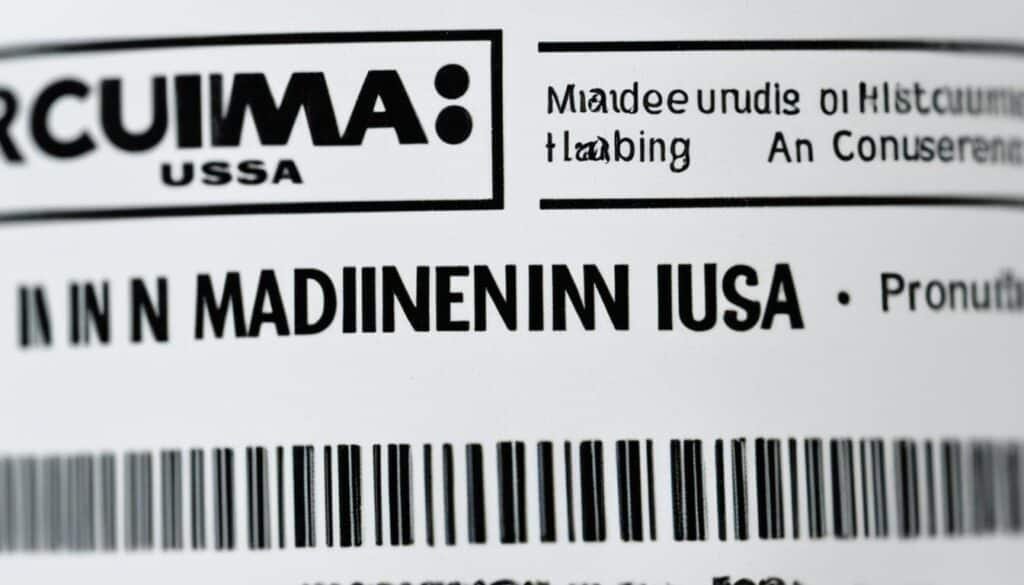When it comes to advertising, there are numerous legal regulations that businesses must adhere to. These regulations ensure that advertising claims are truthful, non-deceptive, and evidence-based, providing consumers with accurate information. Failure to comply with these regulations can result in penalties and damage to a company’s reputation.
The Federal Trade Commission (FTC) is the primary regulatory body in the United States responsible for overseeing advertising practices. The FTC provides guidelines and enforces consumer protection laws to prevent deceptive and unfair advertising practices.
Compliance with FTC guidelines is essential for businesses to ensure their advertising is in accordance with regulations. Additionally, specialized products or services may have additional rules and regulations that apply to them. It is crucial for businesses to thoroughly understand and follow these regulations to avoid legal issues and maintain consumer trust.
Key Takeaways: Legal Regulations Surrounding Advertising
- Legal regulations govern advertising to ensure claims are truthful, non-deceptive, and evidence-based.
- The FTC provides guidelines and enforces consumer protection laws in the United States.
- Compliance with FTC guidelines is crucial to avoid legal issues and maintain consumer trust.
- Specialized products or services may have additional regulations that apply to their advertising.
- Understanding and following regulations is essential for businesses to protect their reputation and avoid penalties.
Truth-in-Advertising Standards for Children and Kid-Related Products
When it comes to advertising targeted at children or promoting kid-related products, truth and transparency are crucial. Advertisers must comply with truth-in-advertising standards to protect young consumers and ensure responsible marketing practices.
The Children’s Online Privacy Protection Act (COPPA) is a significant legal regulation that applies to online advertising for children. It requires advertisers to obtain parental consent before collecting personal information from children under the age of 13. Advertisers must also provide clear and understandable information regarding data collection practices to parents.
Additionally, food advertising to children is subject to specific guidelines outlined by the Federal Trade Commission (FTC). These guidelines aim to promote healthier eating habits and prevent exaggerated or misleading claims in advertisements. Advertisers must avoid using deceptive tactics, such as making false health claims or disguising unhealthy products as nutritious choices.
It’s essential for advertisers to create content that appeals to children’s sensibilities without compromising their well-being. By following truth-in-advertising standards and adhering to COPPA regulations and FTC guidelines on food advertising to children, advertisers can ensure their marketing efforts are responsible and in compliance with the law.
“Protecting children from deceptive advertisements and safeguarding their privacy are critical in today’s digital landscape. Advertisers have a responsibility to prioritize the well-being of young consumers and promote ethical marketing practices.”
When it comes to advertising to children or promoting kid-related products, the focus should be on providing informative and age-appropriate content while avoiding deceptive tactics. This not only benefits consumers but also builds trust and credibility with parents who seek transparency and authenticity in the marketplace.
Overview of Truth-in-Advertising Standards for Children and Kid-Related Products
| Regulation | Description |
|---|---|
| Children’s Online Privacy Protection Act (COPPA) | Requires obtaining parental consent before collecting personal information from children under 13. Advertisers must also provide clear information about data collection practices. |
| FTC Guidelines on Food Advertising to Children | Prevents exaggerated or misleading claims in food advertisements targeting children. Advertisers must avoid deceptive tactics and promote healthier eating habits. |
With a clear understanding of truth-in-advertising standards and regulatory requirements, advertisers can forge a path toward responsible and ethical marketing practices for children and kid-related products. By prioritizing the well-being of young consumers, advertisers can contribute to a healthier advertising ecosystem and build long-lasting relationships based on trust and authenticity.
Disclosure Requirements for Endorsements and Social Media Influencers

In the era of social media and influencer marketing, endorsements have become a powerful tool for businesses to promote their products or services. However, it is essential for companies and influencers to understand and comply with the disclosure requirements set forth by the FTC Act and the FTC’s Guides Concerning Use of Endorsements and Testimonials in Advertising.
According to the FTC Act, any material connection between an advertiser and an endorser must be disclosed. This means that if an influencer receives compensation, free products, or any other benefits from a brand in exchange for promoting their products, they must clearly and conspicuously disclose this information to their audience.
The FTC’s Guides Concerning Use of Endorsements and Testimonials go into further detail about the requirements for disclosure in specific contexts. For example, when an endorsement is made in a video or image-based platform like YouTube or Instagram, the disclosure should be made in a way that is easily noticeable and understood by the viewer or reader.
“The Guides indicate that a simple statement, such as ‘This is a sponsored post,’ may not be sufficient if it is easily overlooked or not prominent enough to be noticed.”
To comply with the FTC’s guidelines, influencers should avoid using ambiguous or confusing language and should clearly disclose their relationships with brands in a way that is transparent and easily understood by their audience.
Example:
| Types of Material Connections | Examples |
|---|---|
| Free Products | Receiving free clothing from a fashion brand for a sponsored post. |
| Financial Compensation | Being paid by a cosmetics company to promote their new skincare line. |
| Affiliate Links | Earning a commission for every sale made through a unique referral link. |
By complying with these disclosure requirements, businesses and influencers can maintain transparency and build trust with their audience. Failure to disclose material connections can lead to legal consequences and damage to one’s reputation.
Furthermore, consumers have the right to know when an endorsement is based on a material connection. This transparency empowers consumers to make informed decisions when purchasing products or services based on the recommendations of influencers.
In summary, it is crucial for businesses and social media influencers to understand and follow the disclosure requirements outlined by the FTC Act and the FTC’s Guides Concerning Use of Endorsements and Testimonials. By doing so, they can ensure transparency, maintain consumer trust, and comply with the law.
Environmental Claims and Green Advertising Guidelines

Companies making environmental claims in their advertising must have reliable scientific evidence to support those claims. It is important for businesses to accurately represent the environmental benefits of their products or services to ensure transparency and build trust with consumers.
The Federal Trade Commission (FTC) provides valuable guidance for green advertising through its Green Guides. These guidelines help businesses make truthful and substantiated environmental claims, ensuring that advertising aligns with consumer protection regulations.
“Environmental claims should be based on sound science and a reasonable interpretation of that science. Any qualification or disclosure should be clear, prominent, and specific.”
The Green Guides set standards for marketers to avoid deceptive claims and ensure they have the scientific evidence to back up their assertions. By following these guidelines, businesses can confidently promote their eco-friendly initiatives without misleading or confusing consumers.
If consumers suspect deceptive environmental claims in advertising, they can file an FTC complaint. The FTC takes these complaints seriously and investigates potential violations of advertising regulations to protect consumers from false or misleading information.
Examples of Environmental Claims:
- Product packaging made from recycled materials
- Energy-efficient appliances
- Renewable energy sources
- Biodegradable or compostable products
- Carbon-neutral practices
Key Considerations for Environmental Claims:
- Substantiate Claims: Ensure that environmental claims are backed by reliable scientific evidence. Conduct proper research and testing to support the claims made in advertising.
- Avoid Overstatement: Avoid making exaggerated claims that cannot be substantiated. Be honest and transparent about the environmental impact of products or services.
- Qualify Disclosures: If any qualifications or disclosures are necessary to provide a full and accurate understanding of the environmental benefits, make sure they are clear, prominent, and specific.
- Keep Abreast of Evolving Standards: Stay updated on the latest revisions to the Green Guides or any new guidelines issued by regulatory authorities to ensure compliance with current advertising regulations.
Advertising Claims for Health-Related Products and Services

When it comes to marketing health-related products or services, it is crucial for companies to back up their advertising claims with solid proof. Health-related products often make bold promises and assertions, such as improved well-being, weight loss, or cure-all solutions. However, these claims need to be substantiated to ensure consumer trust and safety.
The Federal Trade Commission (FTC) is responsible for enforcing regulations on truthfulness and substantiation in the healthcare industry. The FTC aims to protect consumers from deceptive advertising practices and maintains strict guidelines for businesses marketing health-related products or services.
“Consumers have the right to make informed decisions about their health, and it is our role to ensure that advertising claims in the healthcare industry are supported by valid evidence,” says FTC Commissioner, Sarah B. Bostwick.
Businesses must provide solid proof to support their advertising claims. This includes scientific studies, clinical trials, or expert endorsements that demonstrate the effectiveness and safety of their products or services. Merely making unsubstantiated claims can lead to legal consequences and damage a company’s reputation.
To ensure compliance with FTC regulations, businesses should carefully review their advertising materials, including websites, social media posts, and promotional materials. All claims should be truthful and backed by reliable evidence.
Examples of Advertising Claims Requiring Solid Proof:
- Weight loss products claiming rapid and effortless weight reduction
- Supplements promising to cure or prevent specific illnesses or conditions
- Beauty products guaranteeing instant and dramatic anti-aging effects
- Alternative therapies promoting miracle cures for chronic diseases
By promoting transparency and credibility in the healthcare industry, the FTC ensures that consumers can make informed decisions about their well-being. If a company’s advertising claims are found to be unsubstantiated, the FTC can take legal action, impose fines, and require corrective measures to protect consumer rights.
Businesses must prioritize the validity of their advertising claims, as failure to do so not only violates FTC regulations but also jeopardizes consumer trust and confidence. By providing solid proof, companies can build a positive reputation and demonstrate their commitment to consumer well-being.
| Benefits of Providing Solid Proof: | Consequences of Unsubstantiated Claims: |
|---|---|
|
|
By adhering to FTC regulations and providing solid proof for their advertising claims, businesses can establish themselves as credible and trustworthy in the healthcare industry. It is essential for companies to prioritize consumer safety and transparency in their marketing efforts, ensuring that health-related products and services deliver on their promises.
Disclosures for “Made in the USA” Claims

When it comes to advertising products with a “Made in the USA” claim, it is crucial for manufacturers and marketers to be aware of the specific requirements set forth by the Federal Trade Commission (FTC). The FTC has established guidelines and rules to regulate the labeling and disclosure of U.S. content in products.
Under the FTC’s Made in USA Labeling Rule and Enforcement Policy Statement, products that carry a “Made in the USA” label must meet certain standards. These standards are in place to ensure transparency and accuracy in advertising, as well as to protect consumers from deceptive claims.
One important aspect of “Made in the USA” labeling is the disclosure of the amount of U.S. content in the product. If a manufacturer wants to make a claim that a product is “Made in the USA,” it must ensure that a substantial majority of its components and processing are of U.S. origin.
The FTC’s guidelines state that in order for a product to be labeled as “Made in the USA,” all significant parts, processing, and labor must originate in the United States. If any component or processing is sourced internationally, the advertiser must provide clear and conspicuous disclosures to inform consumers about the extent to which foreign content is used.
The key here is full and accurate disclosure. Manufacturers and marketers should clearly communicate to consumers the extent to which the product includes foreign content. This will allow consumers to make informed purchasing decisions based on their preferences for buying American-made products.
In cases where the FTC determines that a “Made in the USA” claim is deceptive, it can take legal action against the advertiser. This underscores the importance of adhering to the guidelines and rules set by the FTC to avoid potential legal ramifications.
By complying with the FTC’s Made in USA Labeling Rule and Enforcement Policy Statement, manufacturers and marketers can demonstrate their commitment to transparency and consumer protection. Additionally, they can build trust with consumers who prioritize purchasing products that are genuinely made in the USA.
Implementing proper disclosures for “Made in the USA” claims is essential for businesses targeting consumers who value American-made products. By understanding and following the FTC’s guidelines, manufacturers and marketers can ensure their advertising is in compliance with the rules and regulations pertaining to U.S. content disclosure.
Online Advertising and Internet Marketing Regulations

When it comes to online advertising, businesses must ensure they comply with truth-in-advertising standards to protect consumers and maintain transparency in their marketing efforts. Additionally, there are specific regulations in place to safeguard consumers and prevent fraudulent telemarketing calls. Let’s take a closer look at the INFORM Consumers Act and the Telemarketing Sales Rule, two key regulations that impact online advertising and internet marketing.
INFORM Consumers Act
The INFORM Consumers Act, introduced in the U.S., aims to increase transparency and combat deceptive online advertising practices. The act requires digital platforms with more than 100 million monthly active users to label, verify, and disclose the advertisers’ identities for political and issue-based ads. This measure enhances consumer protection by promoting accountability and preventing the spread of misleading information.
Telemarketing Sales Rule
The Telemarketing Sales Rule, enforced by the Federal Trade Commission (FTC), plays a crucial role in protecting consumers from fraudulent telemarketing calls. It sets strict guidelines for telemarketers, ensuring they do not engage in deceptive practices, such as making false claims or misrepresenting their products or services. The rule also requires telemarketers to promptly disclose their identity, the purpose of the call, and any financial or other material terms.
“Compliance with online advertising regulations is vital to maintain trust and protect consumers from deceptive practices.”
By upholding truth-in-advertising standards and following the INFORM Consumers Act and Telemarketing Sales Rule, businesses can build credibility, foster consumer trust, and contribute to a healthier online advertising ecosystem.
Implementing these regulations can be challenging, especially for businesses that rely heavily on digital marketing and internet advertising. However, by understanding and adhering to the guidelines, companies can enhance their reputation while safeguarding consumers from deceptive practices.
Next, we’ll explore business guidance on multi-level marketing and business opportunities, providing insights into consumer protection principles and the FTC’s Business Opportunity Rule.
Business Guidance on Multi-Level Marketing and Business Opportunities

Multi-level marketing (MLM) offers individuals the opportunity to start their own businesses and earn income by selling products or services. However, due to the potential for deceptive practices and unfair business practices, the Federal Trade Commission (FTC) provides guidance to the MLM industry to ensure compliance with consumer protection principles.
The FTC has established the Business Opportunity Rule, which applies to sellers of business opportunities, including work-at-home opportunities. This rule requires sellers to provide potential buyers with important information that will help them make informed decisions about the business opportunity. It aims to prevent fraudulent schemes and misrepresentations commonly associated with MLM.
The Business Opportunity Rule mandates that sellers of business opportunities disclose key information, such as:
- The seller’s identifying information, including name, address, and phone number.
- A written document that discloses the earnings potential of the business opportunity, including the average earnings of participants and the percentage of participants who achieve specific levels of income.
- Any prior legal actions taken against the seller or its key personnel for deceptive or unfair practices.
- Refund policies and procedures.
- References of previous purchasers or participants who have achieved success in the business opportunity.
By providing this information, the Business Opportunity Rule aims to promote transparency and protect potential buyers from false or misleading representations. It allows individuals to assess the risks and rewards associated with the MLM business opportunity.
The FTC’s guidance and the Business Opportunity Rule serve as valuable resources for MLM companies and individuals considering participation in such opportunities. By following these guidelines, MLM companies can build trust with consumers and establish a solid reputation in the industry.
Key Information Required by the Business Opportunity Rule
| Information | Description |
|---|---|
| Seller’s Identifying Information | Name, address, and phone number of the seller. |
| Earnings Potential | Average earnings of participants and the percentage of participants achieving specific income levels. |
| Prior Legal Actions | Any legal actions taken against the seller or its key personnel for deceptive or unfair practices. |
| Refund Policies | Details of the refund policies and procedures. |
| References | References of previous purchasers or participants who have achieved success in the business opportunity. |
This image illustrates the concept of multi-level marketing, representing the interconnected network of participants and the potential for earning income through sales and recruitment.
Also Read : Mastering Advertising Design: Tips, Tricks, and Trends
Conclusion
In conclusion, when it comes to advertising, complying with legal regulations is paramount. Advertisers must carefully adhere to FTC guidelines and consumer protection laws to ensure truthful and non-deceptive advertising practices. These regulations are in place to protect consumers from false or misleading claims, promoting fair competition and maintaining the integrity of the advertising industry.
Awareness of advertising compliance is crucial, as failure to comply with these regulations can result in penalties, fines, or damage to a brand’s reputation. It is essential for businesses to stay updated on the latest FTC guidelines and ensure their advertising practices align with the legal requirements.
By following advertising compliance regulations, advertisers can build trust with consumers and instill confidence in their products or services. A transparent and ethical approach to advertising not only strengthens a brand’s reputation but also contributes to a healthier marketplace where consumers can make informed choices based on accurate information.
FAQs
Q: What are the legal regulations surrounding advertising?
A: Legal regulations surrounding advertising encompass a variety of federal and state laws to ensure that advertising and marketing practices are truthful and not misleading to consumers.
Q: What is considered false advertising?
A: False advertising refers to any promotional material that deceives consumers about the product or service being offered, leading them to make purchasing decisions based on inaccurate information.
Q: Are there specific rules that apply to online advertising?
A: Yes, the Federal Trade Commission (FTC) has regulations that apply to online advertising, including rules related to native advertising, the use of environmental claims, and endorsements from third parties to ensure transparency and fairness.
Q: What is the importance of supporting your claims in advertising and marketing?
A: It is essential to support any claims made in advertising with evidence to ensure the credibility of the information being presented to consumers. This helps to avoid any accusations of false or misleading advertising.
Q: How do the FTC regulations protect consumers in advertising?
A: The FTC regulations aim to protect consumers by ensuring that advertising practices are not deceptive or unfair, providing guidelines for companies on how to comply with the law and avoid misleading consumers.
Q: What is the Consumer Review Fairness Act, and how does it impact advertising?
A: The Consumer Review Fairness Act protects consumers’ ability to leave honest reviews of products, services, and businesses without fear of legal repercussions. This act encourages transparency in advertising and marketing practices.
Q: What are the penalties for unlawful advertising practices?
A: Companies that engage in unlawful advertising practices may face penalties such as fines, injunctions to cease misleading activities, or legal action from consumers or regulatory authorities.
Source Links
- https://www.ftc.gov/business-guidance/advertising-marketing
- https://transparency.fb.com/policies/ad-standards/
- https://www.ftc.gov/business-guidance/advertising-marketing/advertising-marketing-basics





